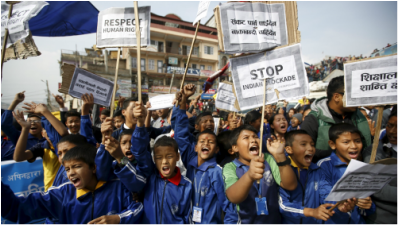|
The Nepal blockade began on September 23, 2015 and has become an economic and humanitarian crisis that has severely affected this small, developing country. The blockade has stopped the supply of all fuel from India, including petrol, aviation fuel and cooking gas. As Nepal gets most of supplies from India, the blockade has basically brought all trade, transportation and tourism to a screeching halt. As a result of this, over 2,000 factories have shut down. Medicines, including vaccines, antibiotics, oxygen and surgical supplies, are becoming scarce. Basic living supplies and food are also in short supply. Unfortunately, much of the earthquake reconstruction work that was planned has been delayed. This all began when the ethnic Madhesi community who live on the southern Nepal-India border started protesting for proportional representation and alleged bias against them in the new Nepali constitution. They believe that the constitution divides the country in a way that does not adequately or fairly represent them. Many in Nepal think that India imposed this undeclared blockade. India has denied the allegation, stating that the supply shortages are the result of the Madhesi protests in Nepal. Whatever is true, any blockade is illegal as there is an international agreement that landlocked countries have free access to ports. A task force from the Madhesi community and the Nepali government have been engaged in talks the last three weeks. Unfortunately, the leaders of the Madhesi party left the talks on January 19 and no consensus regarding their demands for the changes in the constitution was reached. The government will continue to negotiate for a resolution, but many Nepalis continue to be disappointed in the lack of progress. The Nepali government has met with China, their northern neighbor, as a possible source for fuel and supplies. However, the need is so great now that it would be extremely difficult to transport enough goods or fuel over the treacherous, mountainous roads to make a difference. As is so true in most crises in developing countries, the common people are the ones who suffer the most. The Nepali people are ready to begin reconstruction of their country after the devastating earthquake in the spring. Let us hope that this impasse will come to an end soon. Diann Grimm is the Founder and Executive Director of Partners in Sustainable Learning. She is returning to Nepal in April to continue teacher training and to initiate the process of rebuilding early childhood classrooms.
0 Comments
|
Archives
September 2016
Categories |
PiSL is a non-profit 501(c)3 organization.
All donations are tax deductible as allowed by law.
PiSL has no governmental, political or religious affiliations.
PiSL is sensitive to the needs of all cultures.
©2023 Partners in Sustainable Learning. All rights reserved.
All donations are tax deductible as allowed by law.
PiSL has no governmental, political or religious affiliations.
PiSL is sensitive to the needs of all cultures.
©2023 Partners in Sustainable Learning. All rights reserved.


 RSS Feed
RSS Feed
